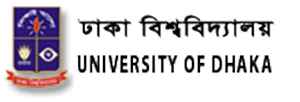Sustainable Development Goals

SDG 10: Reduced Inequalities
SDG 10: Reduced Inequalities at Dhaka University
Dhaka University (DU), as Bangladesh’s leading higher education institution, is deeply committed to Sustainable Development Goal 10 (SDG-10): Reducing Inequalities Within and Among Countries. The university has undertaken a variety of inclusive programs, policies, and community-driven initiatives to address disparities in education, promote fairness, and foster an environment that values diversity across race, gender, religion, socioeconomic status, and abilities.
Through reforms in admission processes, inclusive academic practices, and dedicated support systems, DU actively ensures equitable opportunities for all students. Its research initiatives delve into identifying and addressing systemic inequalities, while its outreach programs extend the institution’s impact to the broader community. Together, these efforts not only fulfill DU’s mission for inclusion but also set an example for reducing inequalities in society at large.
Shaping Future Leaders
1. Inclusive Education Practices Workshop
- Description: The Institute of Education and Research (IER) hosted a workshop titled “Inclusive Education Practices” (June 2023). It focused on equipping educators with methods to accommodate diverse learners, including students with disabilities and those from marginalized communities.
- Key Objectives:
- Promote equity in teaching methodologies.
- Empower educators with tools for fostering a participatory classroom environment.
- Impact: Enhanced the skills of DU faculty and educators from other institutions in addressing diverse learning needs.
- Reference: Workshop on Inclusive Education Practices.
2. Seminar on Gender Equality in Higher Education
- Event: The Department of Women and Gender Studies organized a seminar titled “Promoting Gender Equality in Higher Education” (April 2023).
- Focus:
- Address challenges faced by women in academia.
- Provide actionable strategies to create gender-equitable academic environments.
- Impact: Fostered discussions that led to policy recommendations for eliminating gender biases in higher education.
- Reference: Seminar on Gender Equality.
Innovative Solutions for Tomorrow
- Barriers to Education for Marginalized Communities
- Conducted by the Institute of Education and Research, this research focuses on identifying and addressing barriers that hinder equitable access to education for ethnic minorities, financially disadvantaged groups, and individuals with disabilities.
- Outcomes:
- Provided critical data to inform educational policy reforms.
- Supported the development of programs to bridge the gaps in higher education access.
- Reference: DU Research Initiatives.
2. Gender Inequality in Academia
- Research led by the Department of Women and Gender Studies examines systemic inequalities faced by women in academic leadership and teaching positions.
- Impact:
- Contributed to national discussions on gender equity in education.
- Influenced university-level initiatives to ensure equal opportunities for female faculty members.
- Reference: Seminar on Gender Equality.
Sustainable Campus and Practices
- Reformed Admission Policies
- DU has implemented admission reforms to ensure representation of underprivileged and marginalized groups, including:
- Students from ethnic minorities and hill tracts.
- Members of the transgender community.
- Individuals with disabilities.
- Objective: Provide equitable access to higher education for all.
- Impact: Strengthened diversity within DU’s student body, enriching academic and cultural experiences.
Reference: DU Admission Guidelines
2. Reformed Admission Policies
- DU has implemented admission reforms to ensure representation of underprivileged and marginalized groups, including:
- Students from ethnic minorities and hill tracts.
- Members of the transgender community.
- Individuals with disabilities.
- Objective: Provide equitable access to higher education for all.
- Impact: Strengthened diversity within DU’s student body, enriching academic and cultural experiences.
Reference: DU Admission Guidelines
3.Monitoring Cells for Inequality
- DU has established monitoring cells to address inequalities on campus and provide support to students facing challenges.
- Objective: Offer timely intervention for academic and personal issues related to discrimination or marginalization.
- Reference: DU Monitoring Cells.
Empowering Communities for Change
1. Financial Support and Employment for Students
- DU provides part-time campus employment opportunities for financially challenged students, ensuring they can support themselves while pursuing their education.
- Additional Support: Health insurance for medical needs.
- Impact: Reduced dropout rates and ensured students’ well-being.
- Reference: DU Student Employment Program.
2. Support for International Students
- DU ensures that international students have equal access to facilities, including housing and academic resources, fostering a multicultural and inclusive campus environment.
- Impact: Promoted cultural exchange and global perspectives among the student body.
- Reference: International Students Support.
3. Gender Counseling Services
- The Departments of Psychology and Clinical Psychology, along with the Teacher-Student Center, provide counseling services for all genders.
- Objective: Address mental health issues and offer gender-sensitive support systems.
Reference: DU Counseling Services.
Global Partnerships and Impact
Dhaka University’s initiatives under SDG 10 exemplify its commitment to reducing inequalities by:
- Promoting Diversity: Enacting policies that ensure equitable access to education for underrepresented groups.
- Ensuring Fairness: Establishing rigorous and impartial administrative and academic processes.
- Supporting Well-being: Providing financial aid, health services, and mental health support to students in need.
- Fostering Inclusion: Creating an environment where students and faculty from all backgrounds feel valued and supported.

